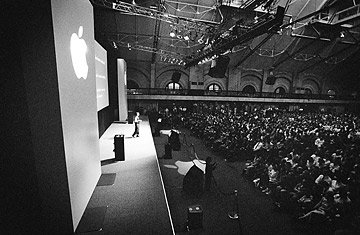
Boston's 1997 MacWorld Expo listens to Jobs on stage.
(7 of 7)
Success may have given Jobs some satisfaction, but it didn't soften him. He remained the difficult, demanding, sometimes unreasonable perfectionist that Apple thought had been dispensable a dozen years earlier. More than any major Silicon Valley company, Apple kept its secrets secret until it was ready to talk about them; every article about the company included the words "A spokesperson for Apple declined to comment." Apple was demonstrably full of talented employees in an array of disciplines, but Jobs' reputation for sweeping micromanagement was so legendary that nobody who admired the company and its products wanted to contemplate what it might be like without him. Shareholders were even more jittery about that prospect: a stock-option-backdating scandal that might have destroyed a garden-variety CEO barely dented his reputation.
But more and more, the world was forced to confront the idea of a post-Jobs Apple. Jobs' singleminded vision created an environment in which rivals, and potential successors, didn't thrive. In 2004 he was diagnosed with pancreatic cancer and told he had months to live; further investigation showed it was a rare form of the disease that could be controlled. Jobs turned day-to-day control of Apple over to chief operating officer Tim Cook, underwent surgery, recovered and returned. Then during a 2009 medical leave, he received a liver transplant. In 2011 he went on another medical leave, which became permanent when he resigned as CEO on Aug. 24, assuming Apple's chairmanship and handing off CEO duties to Cook.
Always happier praising a new Apple product than talking about his private life, Jobs said little about his struggles with ill health. He did, however, address them briefly in a commencement speech he gave at Stanford in 2005. "Your time is limited, so don't waste it living someone else's life," he said, sounding as if the very thought of living someone else's life infuriated him. "Don't be trapped by dogma, which is living with the results of other people's thinking. Don't let the noise of others' opinions drown out your own inner voice. And most important, have the courage to follow your heart and intuition. They somehow already know what you truly want to become. Everything else is secondary."
Jobs was right, as he almost always was, and he took his own advice. He lived nobody's life but his own, and he followed his heart and his intuition. Sometimes they brought him to the edge of ruin. Sometimes they led him to overpower other people's visions and drown out their inner voices with his own. But it's the paradox of Jobs, never to be resolved, that when he was done, he had built some of the greatest tools for creativity and self-expression that humanity has ever seen. He wanted the rest of us to live our own lives fully and richly too, and he was going to make absolutely sure we did--whether we liked it or not.
